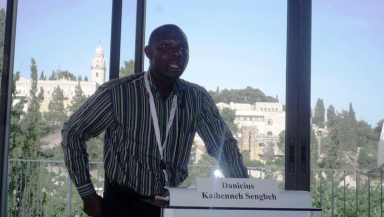
The Secretary General of the Press Union of Liberia (PUL), D. Kaihenneh Sengbeh, has told an international conference that press freedom remains elusive in Liberia in the face of daunting economic challenges and periodic attacks and intimidation on the media mostly by state authorities.
Mr. Sengbeh said critically written and investigative reports, along with their writers, are still being unnecessarily questioned by government authorities instead of them providing clarity and the facts to the public.
Speaking in Jerusalem at an international conference on freedom of the press, Sengbeh stated that these actions by the government are tantamount to threats, intimidation and intended to force the media into self-censorship.
The PUL Secretary General was among 40 journalists, media defenders and experts from nearly 30 countries across the world invited to Israel to speak at the International Conference on the Freedom of the Press organized by the Jerusalem Press Club. It ran from May 25-27 at the historic Mishkenot Sha’ananim Conference Center.
Conference participants discussed and shared experiences on the alarming dangers and threats journalists and media workers continue to face in their respective countries and around the world, thereby limiting press freedom.
Journalist Sengbeh said while the media space in Liberia today is a lot better than the past, two newspapers – National Chronicles and New Broom – are shut down, the latter by President Ellen Johnson Sirleaf for US$5milliion damages.
“Some of the lawsuits filed against media entities and journalists are only intended to silence their critical views and reportage rather than to seek redress,” Mr. Sengbeh told the conference.
The PUL Chief Scribe said current democratic standards and global realities demand more media tolerance from governments around the world, Liberia being no exception.
Sengbeh said attempts by the government in 2014 to license journalists and the current control of advertisements through the Ministry of Information are calculated maneuvers to subject the media to state censorship, especially since media entities depend on advertisements to survive.
He said this is particularly so when the Liberian Government remains the biggest advertiser in a country where the private sectors is weak and sparsely advertises.
Mr. Sengbeh indicated that signing of pro-media freedom laws such as the Freedom of Information Law and the Table Mountain Declaration are more political than practical as journalists and other citizens are still being denied information request, while unfriendly media laws remain unchanged.
“With all of these, you can safely say that the media is not free in Liberia and that most of the commitments from the government are mere political talks and bluffs.”
Mr. Sengbeh also stressed the need for training and fellowships for Liberian journalists as means of exposing them to global media standards and strengthening them in practicing the profession.
Meanwhile, the Liberian journalist has called on government across the world to create more space for journalists and assure freedom of the press.
Making remarks on behave of participants at the Jerusalem Conference, Sengbeh called for a concerted efforts among journalists, media unions and associations to stand up tall for press freedom.
He asserted that journalists were not enemies, but were only playing their roles to ensure that societies are better for the wellbeing of all peoples, and must not be rewarded with threats, intimidation, attacks and other acts of impunity.
17 Mar 22 - Council Members
23 Sep 20 - 56TH PUL ANNIVERSARY ANNOUNCEMENT
10 Aug 20 - PUL Condemns Clara Town Electoral Violence
09 Jul 20 - PUL Releases Thirteenth Media Alert Report
07 May 20 - Citation
06 May 20 - WASH Commission, Others Donate To PUL